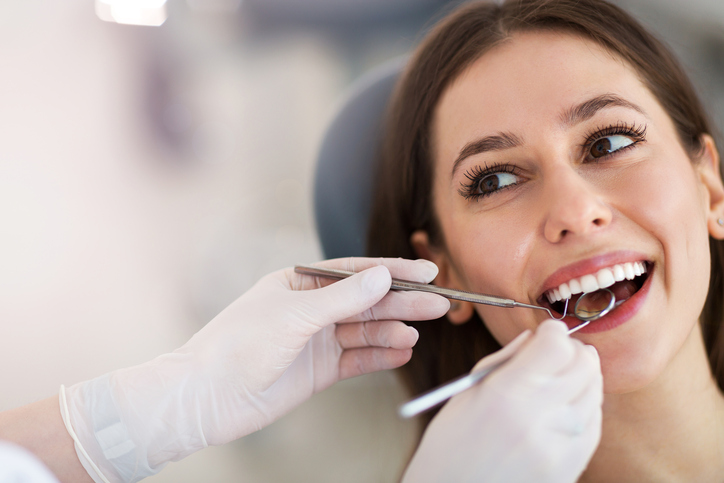Patient Education
Education Will Help You To Make Right Decisions
Every day in our office we speak with our patients to answer any questions that they may have regarding the health and maintenance of their oral condition.
Listed below for your reference are the five questions that we are asked most often. If you would like to discuss any of these questions in more detail or if you have dental questions of your own, we invite you to call us.
Frequently Asked Questions
Every day in our office we speak with our patients to answer any questions that they may have regarding the health and maintenance of their oral condition.
Listed below for your reference are the five questions that we are asked most often. If you would like to discuss any of these questions in more detail or if you have dental questions of your own, we invite you to call us.
1. Why is it important that I visit my dentist every 6 months?
We recommend that patients visit our office at least twice each year to ensure their optimal oral health and to help avoid serious and costly future problems. In addition to cleaning and polishing all the visible and hidden surfaces of your teeth, we also check for many potential problems. Tooth decay, oral cancer and periodontal (gum) disease are just a few examples of problems that can have serious consequences if left undetected. In certain cases, we may even recommend 3 or 4 visits per year in order to properly treat conditions that require more regular attention.
Maintaining a regular appointment schedule with your dentist isn’t just good for your teeth, it’s an important part of your overall health.
2. When should a child have its first visit to the dentist?
Recent studies have shown that by the age of three, a child is already at risk of having cavities which can be caused by something as innocent as putting a baby to sleep with a bottle of juice or milk. Along with taking our first look at your child’s oral condition, this first appointment is also largely focused on the parents and helping them to establish a good oral hygiene program and diet for the child. We believe that a child should have his or her first dental visit when the first tooth erupts or before they reach their first birthday.
It is a little known fact that a child’s primary teeth are vital to the long-term health of their permanent adult teeth. The premature loss of primary teeth as a result of accidents or decay can cause serious problems, including poorly spaced and crooked adult teeth. As a result, it is just as important to care for a child’s baby teeth as it is for the adult teeth that follow.
3. How can I help myself to prevent bad breath?
According to recent studies, almost half the population of adults in North America suffers at least occasionally from bad breath (halitosis). The most common cause of bad breath is bacteria in the mouth and on the back of the tongue. These bacteria produce a volatile sulfur compound, which in turn produces a smell similar to “rotten eggs”. (Other non-dental causes of halitosis include certain foods, smoking, alcohol, hormonal changes or simply being hungry.)
If the halitosis is of oral origin, the treatment usually begins with ensuring meticulous hygiene of the mouth. Your dentist or dental hygienist will check for gum disease and, if necessary, prepare a detailed treatment plan. Tongue scraping should also become an important part of daily home care and part of your regular tooth brushing routine. (it’s easy and painless).
4. How is a mouth guard from my dentist different from one I buy at a sporting goods store?
High-speed collisions that occur during the play of sports like hockey, football, soccer and basketball can cause serious tooth damage. A professionally fitted mouth-guard is the best defense for any athlete against this. The mouth guards provided in our office are custom-made to perfectly fit the wearer’s teeth which can result in a more comfortable and secure fit. In addition, we use a heavier mouth guard material selected based upon each patient’s individual needs. The boil and bite mouth-guards that you purchase in retail stores simply can not provide the same level of protection.
5. How should I deal with my fear of dentists?
A significant percentage of adults suffer from some level of fear of dental treatment – you can take solace in the fact that you are not alone! Given the importance of maintaining healthy teeth and gums to your overall health, it is imperative that you find a way to deal with these fears.
In our clinic we offer a range of techniques to help our patients reduce their anxiety. Here are a few ideas that you might consider:
-
Visualize yourself in a comfortable place while in the dental chair – a warm sandy beach, for example.
-
Avoid drinking beverages that contain caffeine before your appointment.
-
Ask questions about your treatment – quite often fears of the unknown are the worst fears of all.
Our ultimate goal is to enable our patients to receive dental treatment in a comfortable state of mind. Please feel free to call our office if you would like to learn more.
6. Why should i be screened for oral cancer?
Oral cancer is a serious but treatable disease. If detected early, oral cancer, which includes tongue, lip, and mouth cancer, have an 80 to 90 percent survival rate. Regular dental checkups are vital in screening for and identifying oral cancers.
While some people are at higher risk, oral cancer can affect anyone at any age. Disease symptoms include white or red patches or lumps in the mouth, or on the lips, as well as loose teeth, aching jaw, difficulty swallowing, mouth sores that refuse to heal, and unexplained gum bleeding.
Dentists look for signs of oral cancer as part of a regular dental exam. They check the roof, back, and floor of your mouth, along with your teeth, gums, tongue, and cheeks. The tongue exam may also include a gentle tug to check both sides and underneath.
Professional dental care, and regular checkups are the most effective way to detect oral cancer and save your life.
7. What exactly are crowns and bridges, and are they right for me?
A dental crown is a custom-designed, tooth-shaped restoration that is fitted over the prepared surface of a damaged tooth to recapture the appearance and function of the tooth. A bridge is used to replace one or more missing teeth and is usually attached securely to the existing teeth on either side of the gap. Recent developments in dental techniques and materials have allowed dentists to provide crown and bridge restorations that are virtually indistinguishable from a person’s natural teeth in both form and function.
If you suffer from lost teeth or teeth that are badly damaged by decay or accident, crowns or bridges may be able to repair their appearance and preserve their function.
Feel free to contact our offices if you would like more information on crowns and bridges.
8. What are Dental Implants and what does the procedure involve?
Dental Implants are part of a tooth replacement treatment. They are virtually indistinguishable from your natural teeth. These implants are metal posts or frames, usually made of titanium, that are surgically placed under your gums. They then fuse to the bone of your jaw and act as roots. Replacement teeth, called crowns and made of porcelain, are then attached to the implant They will fit securely to your gums because they are held in place by bone, allowing them to look and function just like natural teeth.
Once the implants are in place, your dentist will typically wait a few months to proceed with crowns – temporary appliances are available for you to wear while you wait.
Give us a call today to set up an appointment to find out if dental implants are right for you.




